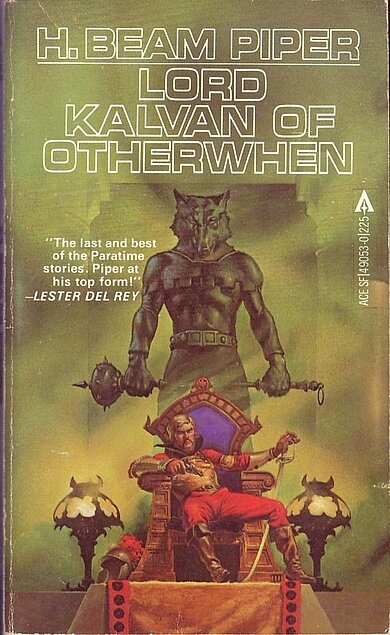Lord Kalvan of Otherwhen Book Review

I picked up this volume because it was mentioned in Armageddon: There Will be War volume VIII. Pournelle cited Piper as a great influence on his own work, especially his Janissaries series, and included in volume VIII was a sequel to Piper's trandimensional adventure story written by John F. Carr and Roland Green. That story was pretty good, so I picked up the original to see what it was all about.
I'm glad that I did. Piper told a great story, full of humor and action, but it is clear that he knew a great deal of history and science as well. Calvin Morrison is a Pennsylvania State Trooper who finds himself accidentally transported into an adjacent timeline by an industrial accident of a more advanced civilization, in the same place but another when. He immediately finds himself embroiled in a war between princes, and makes himself useful due to his interest in chemistry, military tactics, and industrial organization. He fights. He loves. He wins.
For a nerd like myself, this is a fun kind of counterfactual speculation: how could you shape the world differently if you knew all the secrets of modern science in a pre-modern world? There are a lot of ways to do this kind of story. Twain decided to go with a rather cynical satire. This is straight-forward adventure with a heavy dose of history and engineering. In addition to Jerry Pournelle, S. M. Stirling is a modern example of this same kind of story, which is immensely fun, and I also find very educational.
For example, I wondered once what kind of civilization you could rebuild following a technological disaster like the Carrington Event. Nearly all of our advanced technology could be destroyed by a sufficiently powerful solar storm. It turns out that Stirling's novels of the Change have asked almost exactly that question. I wish I had read Stirling sooner, I would have found some answers I was looking for.
This is hard scifi at its best. You take an insight about how the world really works, and you follow the implications in some interesting and otherworldly setting. In this case, it happens to be the Fourth Level, Aryan-Transpacific sector, Styrphon's House sub-sector. Since Piper lived and died at the height of American civilization, the gifts he brings are the first-fruits of industrialization, plus a boundless confidence in the methods of sociology and anthropology, unleavened by any fears of ecological or cultural collapse. If you want to try the latter, Stirling has explored that space pretty well.
While you can clearly see the influence of Piper on later authors, there are interesting differences as well. Religion plays a very different role on Tran than it does in the Stryphon's House sub-sector. Each author has their own take on what really makes the world work, and I've enjoyed them all so far.
I was saddened to learn that Piper took his life shortly after he wrote this book. It is a cracking good yarn, and I would have liked to enjoy more stories of Lord Kalvan. John Carr and Roland Green wrote several more books following on this one, one of which is the short story that brought me here in the first place. I'll pick up the sequels, with the expectation of a homage, true to the spirit of the original.
Comments ()